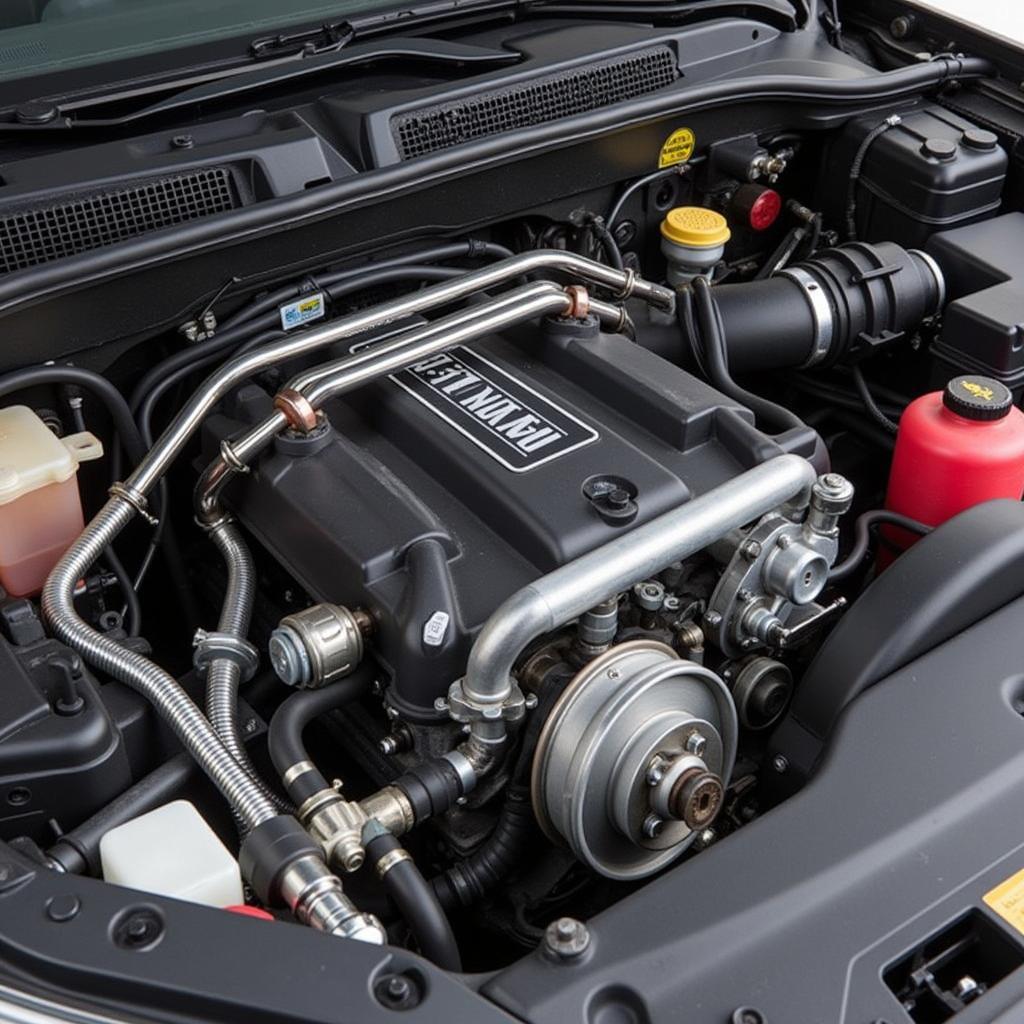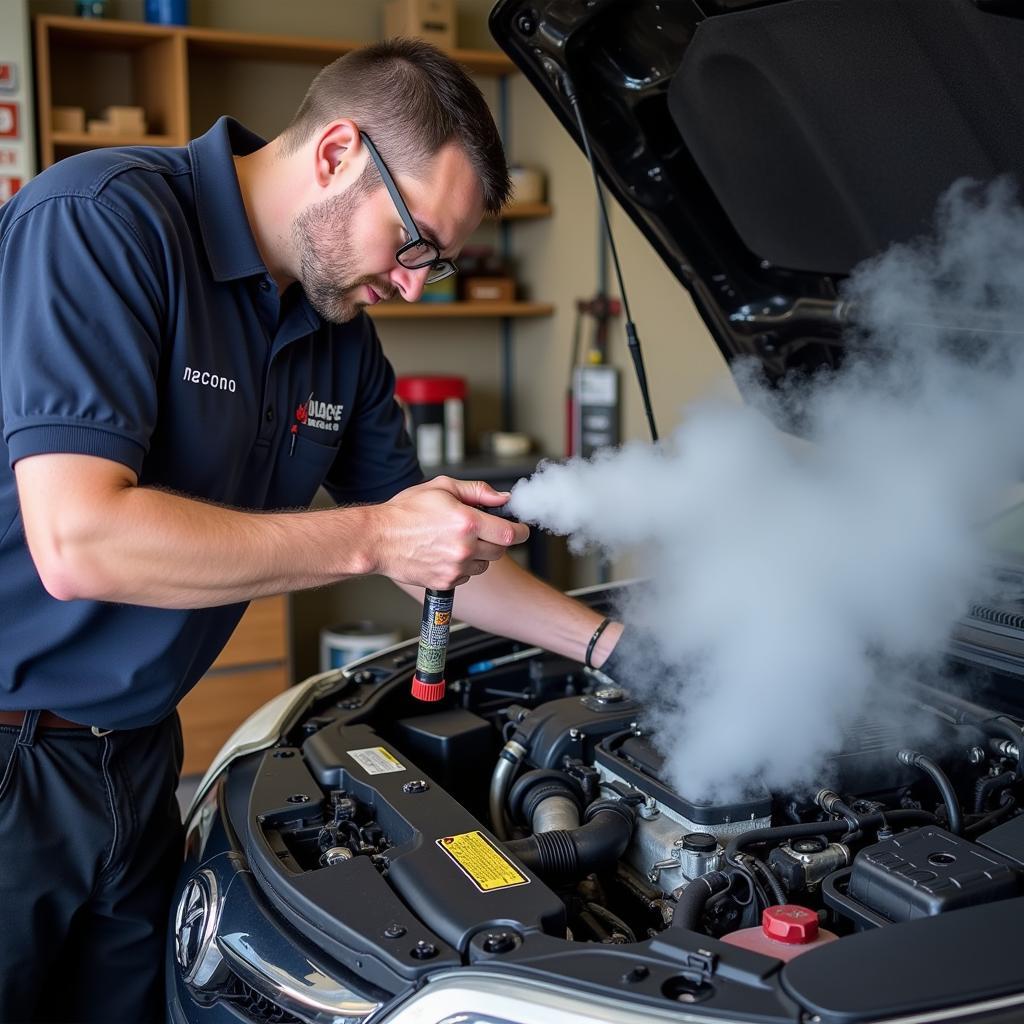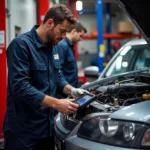Auto air vacuum service is crucial for maintaining a healthy and efficient vehicle. It addresses a range of potential issues stemming from vacuum leaks, ensuring optimal performance and fuel efficiency. This guide will delve into the importance of this service, common symptoms of vacuum leaks, diagnostic procedures, and the benefits of regular maintenance.
Understanding the Importance of Auto Air Vacuum Service
A network of vacuum hoses and components plays a vital role in various vehicle systems, including power brakes, emission control, and HVAC. A leak in this system can disrupt these functions, leading to decreased performance, increased fuel consumption, and even safety hazards. Regular auto air vacuum service identifies and addresses these leaks, ensuring the smooth operation of your vehicle.
Common Symptoms of Vacuum Leaks
Identifying a vacuum leak isn’t always straightforward. However, several tell-tale signs can indicate a problem. These include:
- A hissing sound coming from the engine compartment.
- Rough idling or stalling.
- Decreased braking performance.
- Problems with HVAC controls.
- Increased fuel consumption.
- Check engine light illumination.
 Car Engine Showing Vacuum Leak Symptoms
Car Engine Showing Vacuum Leak Symptoms
Diagnosing Vacuum Leaks: A Step-by-Step Guide
Diagnosing a vacuum leak requires a systematic approach. Here’s a step-by-step guide:
- Visual Inspection: Carefully examine all vacuum hoses for cracks, splits, or disconnections. Pay close attention to areas where hoses connect to components.
- Propane Test: With the engine running, carefully introduce propane gas near suspected leak areas. A change in engine RPM indicates a leak.
- Vacuum Gauge Test: Connect a vacuum gauge to the intake manifold and observe the reading. A fluctuating or low reading suggests a leak.
- Smoke Test: This involves introducing smoke into the vacuum system to pinpoint the exact location of the leak.
 Mechanic Performing a Vacuum Leak Test
Mechanic Performing a Vacuum Leak Test
Benefits of Regular Auto Air Vacuum Service
Regular auto air vacuum service offers numerous benefits:
- Improved Fuel Efficiency: By sealing leaks, the engine operates more efficiently, resulting in better fuel economy.
- Enhanced Performance:** A properly functioning vacuum system ensures optimal performance of various vehicle systems.
- Reduced Emissions:** A sealed vacuum system helps maintain proper emission control, reducing harmful pollutants.
- Increased Safety:** Maintaining the vacuum system, especially for power brakes, is crucial for safe vehicle operation.
- Prolonged Engine Life:** Regular maintenance prevents further damage to engine components caused by vacuum leaks.
“Regular vacuum service is often overlooked, but it’s a critical part of maintaining a healthy engine,” says John Smith, ASE Certified Master Technician. “It can prevent costly repairs down the road and ensure your vehicle runs smoothly and efficiently.”
The Role of Technology in Auto Air Vacuum Service
Modern diagnostic tools play a significant role in efficiently identifying and addressing vacuum leaks. Specialized equipment like smoke machines and electronic vacuum testers allows technicians to pinpoint leaks quickly and accurately, minimizing diagnostic time and maximizing repair efficiency.
Conclusion
Auto air vacuum service is essential for maintaining the health and performance of your vehicle. Regular inspections and prompt repairs can prevent costly problems and ensure optimal fuel efficiency, performance, and safety. Don’t neglect this vital service – address any potential vacuum leaks promptly to keep your car running at its best.
FAQ
- How often should I get an auto air vacuum service? It’s generally recommended to have your vacuum system checked during regular maintenance or if you notice any symptoms of a leak.
- Can I fix a vacuum leak myself? While some minor leaks can be addressed with basic DIY skills, it’s best to consult a qualified technician for accurate diagnosis and repair.
- How much does an auto air vacuum service cost? The cost varies depending on the severity of the leak and the labor involved.
- What happens if I ignore a vacuum leak? Ignoring a vacuum leak can lead to more serious problems, including engine damage and safety hazards.
- How can I prevent vacuum leaks? Regular inspections and maintenance are the best ways to prevent vacuum leaks.
- Are there different types of vacuum leaks? Yes, leaks can occur in various parts of the vacuum system, including hoses, fittings, and components like the intake manifold.
- What’s the difference between a vacuum leak and an exhaust leak? A vacuum leak affects the intake system, while an exhaust leak affects the exhaust system. They have different symptoms and require different repairs.
“Addressing vacuum leaks proactively can save you money and headaches in the long run,” adds Jane Doe, Automotive Engineer. “It’s a small investment that can have a big impact on your vehicle’s overall health.”
For any assistance or queries regarding auto diagnostics and repairs, please contact us via WhatsApp: +1(641)206-8880, Email: [email protected] or visit us at 321 Birch Drive, Seattle, WA 98101, USA. Our customer service team is available 24/7.


